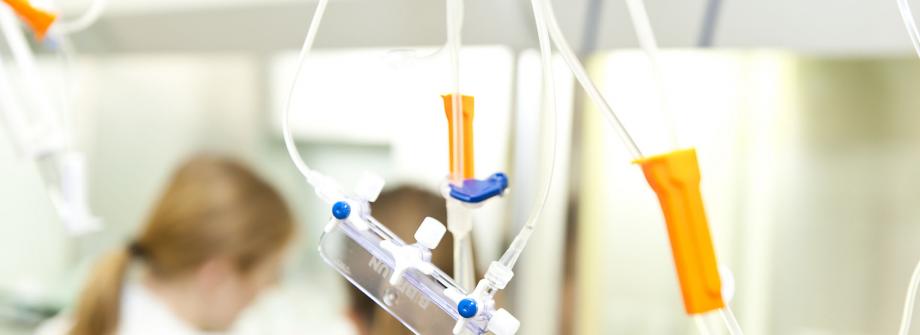
June 2023 Clinical Case of the Month
Title: CAR T-cell therapy for the treatment of relapsed/refractory DLBCL
Submitted by: Real case treated at Mayo Clinic in Jacksonville, FL, USA
Physicians expert perspective: Firas Baidoun and Mohamed A. Kharfan-Dabaja
A 45-year-old woman was referred to our center for treatment of refractory diffuse large B-cell lymphoma (DLBCL). Her past medical history consisted of hormone receptor negative/HER-2 positive breast cancer in her 30s treated with neoadjuvant chemotherapy, surgical resection, radiation therapy and trastuzumab maintenance for 1 year. Her DLBCL presented as an ileum mass and mesenteric lymph nodes. Front-line therapy consisted of chemoimmunotherapy with cyclophosphamide, doxorubicin, vincristine and prednisolone plus rituximab (R-CHOP). Response assessment after 3 cycles of R-CHOP documented evidence of disease progression. Her second line therapy consisted of a chemoimmunotherapy combination of ifosfamide, carboplatinum and etoposide plus rituximab (R-ICE). After 3 cycles of R-ICE, response assessment showed evidence of persistent disease. The patient was evaluated for treatment with chimeric antigen receptor T-cell therapy (CAR T-cell). Vital organ work up demonstrated adequate cardiac, hepatic, pulmonary and renal function. Also, infectious disease work up did not show evidence of active infections; and work up for HIV, hepatitis B and hepatitis C were all negative. She received lymphodepleting chemotherapy consisting of fludarabine plus cyclophosphamide (days -5, -4, and -3) followed by infusion of axicabtagene ciloleucel (axi-cel) on day 0. Post CAR T-cell response assessment confirmed complete metabolic response (CR) on day +30 after the procedure. Subsequent radiologic evaluation at 3 months confirmed continuous CR. Her most recent evaluation at 3 years post CAR T-cell infusion continues to demonstrate CR.
The patient would like to know for what her expected 5-year overall survival.
A. 42.6%
B. 30%
C. 64.4%
D. 90%
Expert Perspective
CAR T-cell therapy has revolutionized the treatment of relapsed/refractory (R/R) DLBCL, particularly in patients who had failed 2 or more prior lines of systemic chemoimmunotherapy. Prior to CAR T-cell, the probability of attaining a CR to third-line conventional chemoimmunotherapy was estimated to range between 2% to 15% based on the SCHOLAR-1 study1. The ZUMA 1 study which evaluated the efficacy of axicabtagene ciloleucel in 101 patients with R/R large B cell lymphoma (69% had received 3 or more prior lines of therapy)2. This study showed that a CR was attained in 55% of cases. Moreover, a recently published 5-year follow up of ZUMA 1 showed that 5-year overall survival rate was 42.6% (all patients) and 64.4% in those patients who achieved a CR to axi-cel3.
Correct Answer – C
References:
- Crump M, Neelapu SS, Farooq U, et al. Outcomes in refractory diffuse large B-cell lymphoma: results from the international SCHOLAR-1 study [published correction appears in Blood. 2018 Feb 1;131(5):587-588]. Blood. 2017;130(16):1800-1808. doi:10.1182/blood-2017-03-769620
- Neelapu SS, Locke FL, Bartlett NL, et al. Axicabtagene Ciloleucel CAR T-Cell Therapy in Refractory Large B-Cell Lymphoma. N Engl J Med. 2017;377(26):2531-2544. doi:10.1056/NEJMoa1707447
- Neelapu SS, Jacobson CA, Ghobadi A, et al. Five-year follow-up of ZUMA-1 supports the curative potential of axicabtagene ciloleucel in refractory large B-cell lymphoma. Blood. 2023;141(19):2307-2315. doi:10.1182/blood.2022018893
Contacts
Mohamed A. Kharfan-Dabaja, MD, MBA, FACP
Professor of Medicine
Vice-chair, Hematology
Director, Blood and Marrow Transplantation and Cellular Therapies
Director, Inpatient Hematology Unit
Medical Director, Cancer Research Office (Mayo Clinic Florida Campus)
KharfanDabaja.Mohamed@Mayo.edu
Firas Baidoun, MD, FACP
Hematology-Oncology Fellow
Mayo Clinic Florida
Baidoun.Firas@Mayo.edu
Future Clinical Case of the Month
If you have a suggestion for future clinical case to feature, please contact Anna Sureda.